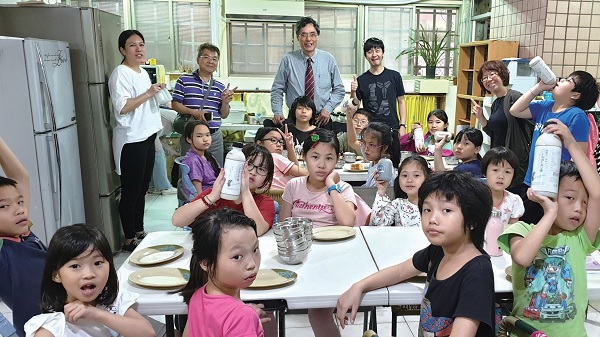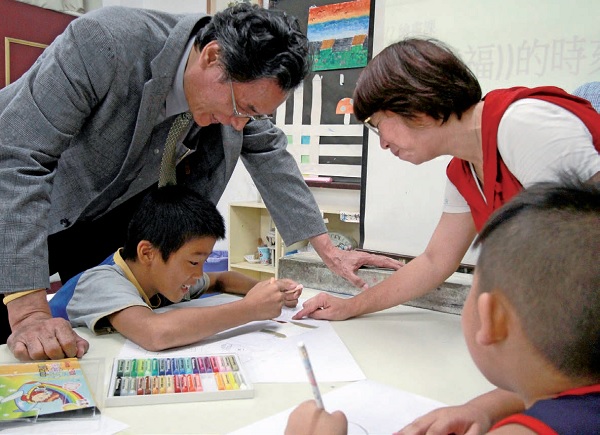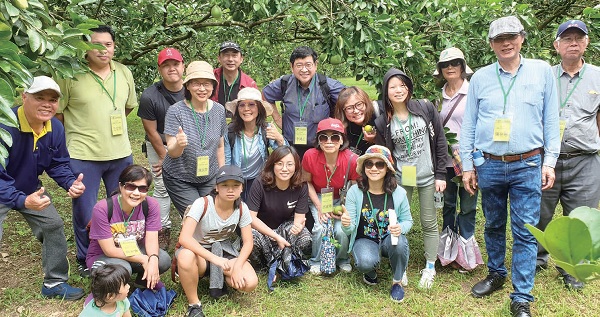The rural poverty problem you don’t know about
Picture/Pastor Chen Zaihui
【Pastor's Chapter】
[Editor's Note]: Because he couldn't bear to see the unequal treatment of children from rural tribes, Pastor Chen Zaihui retired from pastoral service for many years and devoted himself to ministry to rural tribes in Taiwan. Over the years, he has set up "Starlight Classrooms" in various tribes, dedicated to tutoring children's academic and character education. In addition, he also set up kendo classes, painting classes, music classes, etc. Because of Chen Zaihui’s complete commitment, the children have changed! Meticulous training in kendo class, sword and shoe training, cultivates children's calmness and tenacity; in painting class, children's imagination and creativity are inspired, and they learn to use artistic media to express their inner suppressed emotions; in music class, no Under the pressure of the school performance threshold, the children worshiped God with their original and innocent singing.
However, during the service, the path of the pastor and his wife was not smooth. Both of them suffered from incomparable physical pain: the wife's cerebral blood vessel ruptured; the pastor suffered from liver cancer. After seven days of surgery, he received 40 critical illness notices. He miraculously survived, even the doctors couldn't believe it. When his body was being attacked mercilessly by cancer cells, Chen Zaihui once complained about God, but was finally saved by the sacrificial love on the cross. He believed that the selfless love of Jesus was an example that he should learn from throughout his life.

Is it tolerable, which one is intolerable?
"Everyone has compassion" is what Mencius said more than 2,000 years ago. Yes, everyone has basic compassion, and most people can lend a helping hand to the poor around them. I don’t know where everyone’s understanding of poverty comes from, but the depth of their feelings about poverty should not be apparent from superficial numbers. In the 1980s, about 40,000 people died of poverty every day around the world, but that number has now dropped to 17,000. It’s hard to imagine that there are still one billion people living in poverty in the world!
In the 84th year of the Republic of China (1995), I returned to Hualien from Taipei and was preparing to take over as the pastor of a Christian hospital. Just when I was happy that God had sent me an important job, I also witnessed for the first time the terrifying power of poverty. It can tear humanity apart and even destroy a family. A six-year-old girl was sold to a fenghua district by her parents for NT$300,000 because her family was poor. She was innocent at this age, but she was forced to accept 30 prostitutes a day. How can I endure such things that are outraged by both humans and gods? With such a cruel case around me, my instinct is: What else is more important in the world than this?
How is it possible that poverty cannot be solved? It’s not just about giving more subsidies. Over the past 30 years, many smart and wealthy people have been working hard to find solutions to poverty. Many non-profit organizations have invested huge resources to expand education in rural areas and create job opportunities. On the other hand, the government has also successively implemented policies to assist disadvantaged groups. roll out. But the result is surprising: when the social wealth gap is getting wider and wider, there is still no way to solve the problem of poverty in remote areas.

Why are disadvantaged groups marginalized?
When I first started serving tribes more than 20 years ago, at a gathering, I asked the children present: "Are there any Amis children here? Please raise your hands!" No one raised their hands. I asked again: "Are there any Taroko children?" No one raised their hands. It turns out that in that era when Aboriginal people were discriminated against, no child dared to admit his identity. Today, 20 years later, the government has formulated many policies to assist disadvantaged groups. In order to obtain government subsidies, Aboriginal people are now trying their best to find evidence to prove their Aboriginal ancestry. However, the "residual aid method" not only failed to eliminate the poverty among the tribes, but also indirectly wiped out the original self-confidence and tenacity of the indigenous people.
After working in tribes for many years, I found that because aboriginal children have lived in deep mountains and wild forests for many years, they are better able to face difficulties and setbacks in the environment than urban children. At the same time, because they develop a broad mind in the simplicity of nature, they are easily satisfied with the current situation. Often a small piece of bread can make them happy for a whole day. However, the poverty of the indigenous people does not come from the lack of materials and money, but mainly from the "unfair treatment" in the social system.

What are the hidden causes of poverty?
Human rights lawyer Gary Haugen is the CEO and founder of International Justice Mission. In 2015, he mentioned in his TED talk "The Hidden Causes of Poverty That Today's World Must Face Up": "I suddenly realized that none of the subsidies for children, micro-loans, traditional anti-poverty programs, etc., could curb poverty. Social violence that prevents corruption, and poverty is the product of social violence. "So as a judicial officer, he actively formulates applicable laws to effectively prevent social corruption and violence. In fact, in South Asia and many parts of the world, the chance of being punished by law for intentional bullying is lower than being struck by lightning. While we are working hard to gather supplies to help billions of people escape poverty, those rampant social evil forces groups are also using shameful looting to take away daily necessities from the hands of the recipients, without any protection at all. judicial sanctions. Because of such a corrupt mess, no matter how much external donations are made, the poor will remain poor.
In the 1970s, the human trafficking problem in Taiwan was so serious that the United Nations human rights organization came to investigate and claimed that there were 100,000 child prostitutes in Taiwan, especially in the Hualien area. In view of this, civil society groups took the initiative to initiate the formulation of the "Child Sex Trafficking Prevention Ordinance" to prevent human trafficking. This is Taiwan's first law drafted by the private sector and passed by the Legislative Yuan. The decree was announced and implemented, and I was honored to participate and join in the work of supervising its implementation. The problem of human trafficking of young prostitutes in Hualien soon improved significantly.
However, the crux of Taiwan's rural poverty problem does not entirely lie in laws. Q School founder Liu Ting'an's column "The World I See" contains a thought-provoking article "Thinking of the Poor". He mentioned that the reason why children in rural areas inherit poverty is because they do not know that there are better choices and lack the vision to "make good decisions." He said: "Urban children know from an early age what internships they should apply for, which clubs they should join, which friends they should make, and which industry they should enter before they will have a future. But children from rural areas know nothing about these. They go to restaurants to serve dishes, They may make money faster by going to the electrical appliance shop to repair computers or moving bricks on construction sites, but they are not helpful at all to the majors they study and the careers they aspire to.”

The poor will always be poor?
This is "poverty thinking", and this negative impact will continue to affect their future after graduating from school. To this end, Liu Ting'an believes that it is necessary to build a new type of school and improve the quality and vision of teachers to help rural students break through their inherent thinking shackles. In new types of schools, teachers with rich social experience must be recruited, so they must recruit outstanding people in various fields to pass on their unique ideas, vision and first-hand observations to students.
It would be an exaggeration to say that poverty in rural areas is an inheritance of mediocrity. Because there is a common problem of intergenerational upbringing in rural areas, there is a shortage of educational resources, there are no teachers, no talent, no equipment, no equipment, and even basic life education cannot be studied well, let alone school education? In addition, funding for education in rural areas of Taiwan is not properly planned. To pass the exam, you have to rely on the extra-point policy for aborigines, and it is not necessarily possible to continue studying in university. Only a few people know how to apply for various government subsidies. The conclusion is: poor people remain poor.
But does rural poverty really have nothing to do with us? God takes care of orphans and widows. Poverty and social justice are often mentioned in the Bible, "He who has mercy on the poor lends to the Lord, and the Lord will repay him for his good deed" (Proverbs 19:17) "If your brother becomes poor in your presence and is in need, you will Help him and make him live with you as a stranger and a sojourner” (Leviticus 25:35). The problem of poverty in remote rural areas should be a major concern for Christians and churches.
Twenty years ago, because the life and soul of an innocent six-year-old girl was crippled, I resolutely left pastoral work and went to tribal ministry, hoping that society would treat tribal people more fairly. Over the years, my full dedication has made me clearly understand that social welfare agencies must not just focus on solving individual cases, but must start from the fundamental family problems, otherwise their efforts will be in vain.

Create a win-win situation and start philanthropic undertakings to connect with enterprises
In 2011, the "Hualien Valley Ruosi Holistic Care Association" was founded, hoping to use purpose-oriented thinking to re-plan the method of tutoring children, start anew, and introduce effective educational resources and strategies. In order to enable my children to face society and live independently when they grow up, I seek more specialized educational assistance.
The root cause of rural poverty lies in the failure of tribal industries to be properly developed, so a social enterprise was created to improve tribal industries. For example, in the past few years, I have been traveling around to find ways to sell Wendan for the Hegang tribe. Although this social enterprise can only sell 4,000 boxes of grapefruit a year, I have seen significant changes in the life of the tribe. However, the improvement of tribal industries cannot be supported by one company alone, but requires the joint participation of various companies and resources to produce more specific results.
The launch of the national "Republic of China Seed Charity Association" in 2018 made me see that the only people who can truly change the tribe must be the residents of the tribe. Hegang Presbyterian Church is the most solid center of strength for this tribe. Hegang Presbyterian Church plays an important role in promoting development among tribes, taking root in local life and culture, organizing local network resources, and connecting with external resources.
The function of the "Republic of China Seed Charity Association" is to serve as a media channel for cooperation between enterprises and tribes. On the one hand, it integrates local resources, and on the other hand, it actively pools corporate capabilities and technologies in metropolitan areas to effectively use social resources. Invest in tribes and use corporate wisdom to develop tribal industries. In this way, rural tribes have become attractive industrial bases, the problem of poverty has been solved, and the burden of social welfare institutions on the rural economy has been suddenly relieved. This win-win and mutually beneficial strategy benefits both rural areas and cities.
There are so many things worth doing in the world, some of which I may not be able to accomplish by myself in this life, and may not be immediately given any value in the long history. Only faith, hope and love in Christ guide us forward. As the apostle Paul said: “Brothers, I do not count myself as having already gained; but one thing I do: forgetting what is behind and reaching forward to what is before, I press toward the goal to win the high calling of God in Christ Jesus the reward you have come” (Philippians 3:13-14).

Chen ZaihuiPastor, graduated from the Graduate School of Taiwan Theological Seminary. He is the founder of the "Seed Charity Association of the Republic of China" and "Seed Social Enterprise Co., Ltd." and the chairman of the "Hualien County Gu Ruosi Holistic Care Association". We are fully committed to improving tribal industries and solving poverty problems in rural areas.

